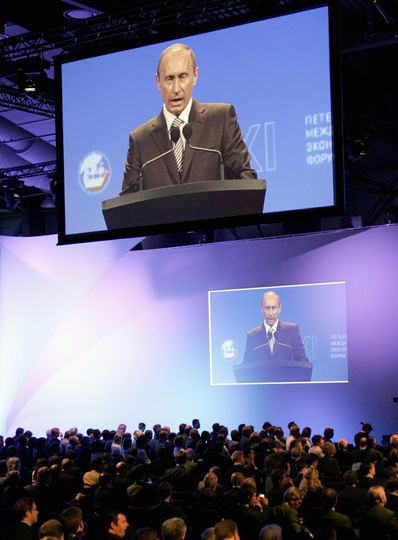You need not have a third eye to predict dramatic changes the entire world is looking at. The most important reason iseconomics where all major processes are bound to include at least five centres of global power: North America (the United States and Canada), the European Union, China, Russia, and Japan. In other words, the new reality, like it or not, is that the unipolar world dominated by the U.S. and its closest allies increasingly gives way to multipolarity.
This trend is confirmed by all recent landmark events. President Vladimir Putin opened the Russian Economic Forum in St Petersburg on June 8-10, emboldened by the G8 summit at Heiligendamm, with impressive figures suggesting continued economic growth: $150 billion in foreign investment by 2007 plus, according to the Central Bank, $60 billion in the five months of this year alone. More importantly, investment is no more a one-way street. “I have informed by counterparts that [Russian] companies had invested about $140 billion around the globe [by the end of] 2006,” he told the forum.
This indicator is important qualitatively as well as quantitatively.
In fact, it signifies that Russia is no more an island in the financial world, but part of the global economic mainland, and already an important part at that.
This is the right context for any assessment of the meetings at Heiligendamm and in St Petersburg.
In some ways, St Petersburg was probably of the same economic consequence as the G8 summit. The Forum brought together over 6,000 participants (2,500 speaking on the agenda), including official delegations from over 60 countries, presidents of Russia and most CIS states, most Russian regional governors and federal ministers, and leaders of leading Russian companies.
Combined with the attendance of about 500 executives from the top 1,000 international companies, that probably justifies comparisons of the St Petersburg forum with Davos.
The debate, previously confined largely to Russia’s internal issues and Russia-West relations, went beyond regionality and became really global. Rather than asking around for loans and investment, this time Russia was talking as an active player, willing to lend money and invest proactively – a message President Putin, first deputy prime minister Sergei Ivanov and others, including foreigners, sought to send. In yet another sign of the forum’s global nature, Putin awarded energy scientists for energy efficiency and innovation achievements, and President of Kazakhstan Nursultan Nazarbayev used the forum to formally present his idea of a Eurasian Economic Community working as a link between the European Union and ASEAN.
In his speeches, Putin consistently pressed home what he had said during the G8 summit: “The world is changing as we speak. Countries treated as basket cases yesterday are become fastest-growing economies in the world.” In this world, Russia, already internationally recognized as a fast-growing economy, just cannot afford to be a second-tier political entity. Russia is ready to integrate with organizations regulating global markets and economic relations, but it will not do so on passive and/or unequal terms.
“These structures, often established to be run by a limited number of active players, sometimes look archaic, undemocratic, and unwieldy. They do not consider the contemporary balance of forces, which is why old decision-making procedures just do not work – something the World Trade Organization and the Doha round clearly signify,” he said.
He said the same about the world’s financial institutions created after the WWII, in a completely different world.
Today, two reserve currencies (the U.S.
dollar and the Euro) are already not enough. Putin urged for as many as four, clearly intending to push through the Russian rouble as one of them.
Foreign participants also said Russia’s prospects were bright and robust John Lipsky, second-in-command of the International Monetary Fund, described Russia’s prospects as “exceptional” on the basis of its resource wealth and highly educated population.”













